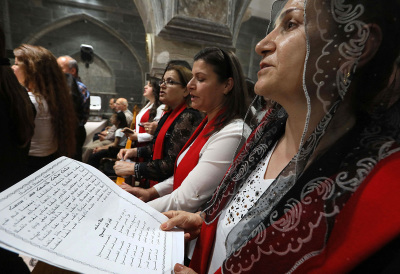Iraqi Kurdistan: Fostering coexistence amid regional challenges

In the heart of Iraqi Kurdistan lies Ain Kawa, a Christian oasis where diverse Christian communities from regions plagued by adversity find a refuge of coexistence. The resilience of Ain Kawa's inhabitants, coupled with the visionary leadership of Mr. Messud Barzani and the Kurdish government, has created a haven for Christians amidst the challenges posed by neighboring countries.
Ain Kawa stands as a unique testament to the triumph of unity over adversity. Families affected by terrorism in Syria and those who lost jobs in Lebanon due to political turmoil have found solace alongside Christians fleeing the perils of Baghdad and Mosul. Maronites, Syriac Orthodox, Chaldeans, Assyrians, Greek Orthodox, and Melkite Catholics coexist in harmony, embodying a historic convergence of Eastern Christian communities.
Crucial to Ain Kawa's success is the support and encouragement of Mr. Messud Barzani, whose policies restrict non-Christians from purchasing real estate in the neighborhood. This foresighted measure, supported by the tolerant Kurds of Erbil, safeguards Ain Kawa from suffering the fate of other Christian neighborhoods in the region, where forced sales and seizures of property occurred as native populations fled.
The optimism palpable among Ain Kawa's indigenous and newly arrived Christians is further fueled by the government's commitment to economic openness and technological advancement under the leadership of Masrour Barzani. Advanced degrees among the residents present a wealth of opportunities, creating a promising environment for Levantine and Iraqi Christians to rebuild their lives.
As the international community observes the success of Ain Kawa, Western governments should actively support the efforts of the Kurdistan Regional Government (KRG). The KRG, despite facing challenges from Iran, Turkey, and Iraq, has demonstrated a commitment to preserving religious diversity and fostering stability.
Western nations should lend their support to the KRG's initiatives, providing assistance to address political, economic and environmental challenges. Diplomatic efforts should encourage open dialogue to ensure the continued safety and security of Ain Kawa as a haven for Christians in the MENA region.
What is happening today in Erbil and Iraq’s Kurdistan is the perfect recipe not only for preserving Christians in the Middle East, but for stability and peace capable of preserving security, the economy, and the ability of governments to fight any destabilizing factors such as epidemics, security, economic, and even environmental threats.
The spirit of the birth of Jesus Christ, which does not hide itself today in the Kurdistan region of Iraq, reflects a bright and hopeful picture in the Middle East, despite the many challenges facing the regional government, from financial pressures and disputes with the central government in Baghdad to security threats and others.
While American soldiers far from their families this Christmas season are exposed to bombing and threats at American bases in Iraq, Washington is not using the fullest potential of the partnership with the allies in Iraqi Kurdistan, which led to the defeat of ISIS, an important task that could not have been accomplished in Syria or Iraq without coordination and partnership with the Erbil’s government.
For the good of American national security and pluralism in the Middle East, Washington must focus on protecting Erbil and repeating Erbil’s transgressive experience in protecting endangered minorities in the Middle East because a less pluralistic and less diverse Middle East is a more violent and more harmful Middle East to the international community.
The success of Ain Kawa reflects the potential for coexistence and prosperity, even in regions rife with historical tensions. By supporting the KRG and acknowledging the importance of religious diversity in the Middle East, the West can contribute to the establishment of more safe havens for persecuted communities, fostering hope and resilience in the face of adversity.
Hadeel Oueis is a Philos Project Senior Fellow.




















